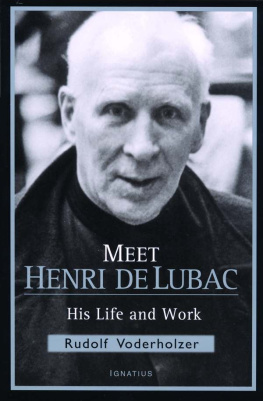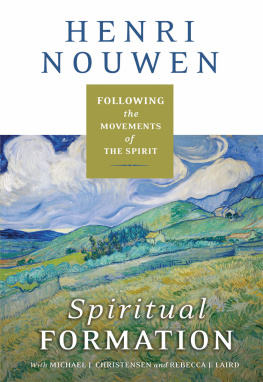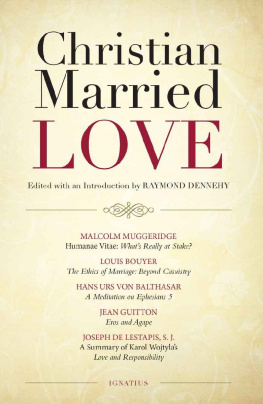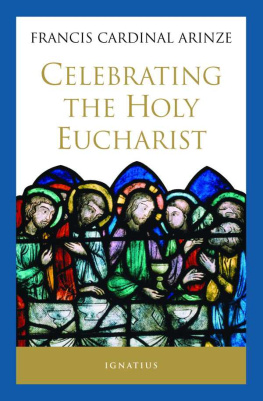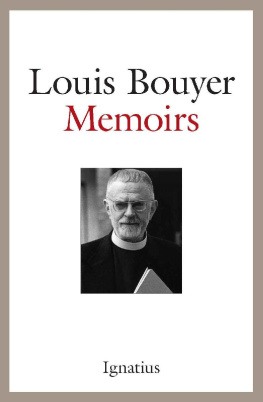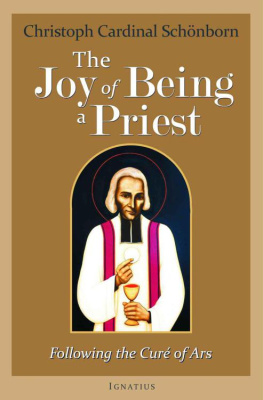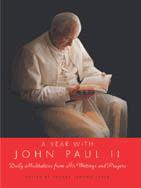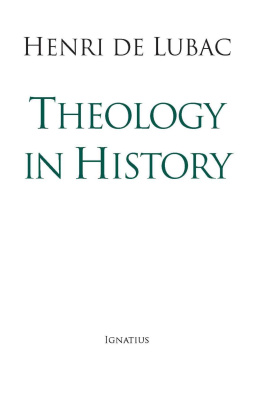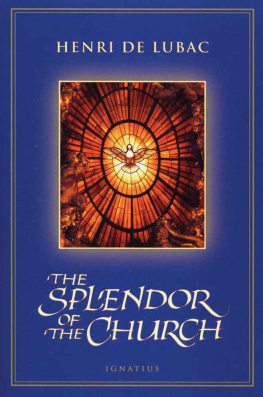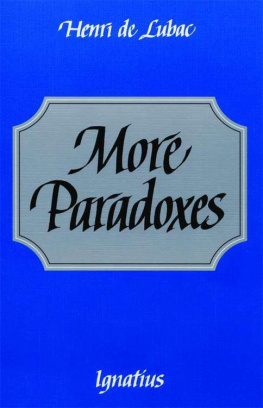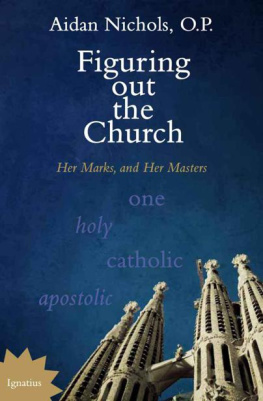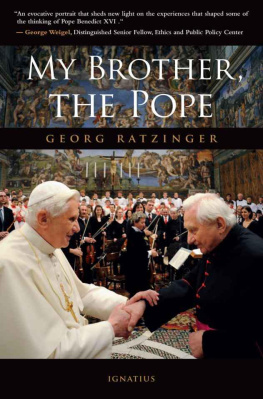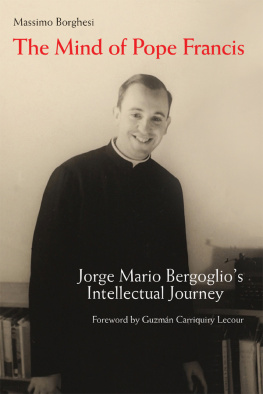MEET HENRI DE LUBAC
Rudolf Voderholzer
Meet Henri de Lubac
Translated by
Michael J. Miller, M.A. Theol.
IGNATIUS PRESS SAN FRANCISCO
Original German edition
Henri de Lubac begegnen
Zeugen des Glaubens series
1999 by Sankt Ulrich Verlag, GmbH
Augsburg, Germany
Cover photograph of Henri de Lubac
Cover designer: Riz Boncan Marsella
2008 by Ignatius Press
All rights reserved
ISBN 978-1-58617-128-5
Library of Congress Control Number 2006939359
Printed in the United States of America
CONTENTS
FOREWORD
Never... have I found anyone with such a comprehensive theological and humanistic education as Balthasar and de Lubac, and I cannot even begin to say how much I owe to my encounter with themCardinal Joseph Ratzinger, now Pope Benedict XVI.
Many have echoed then-Cardinal Ratzingers judgment about the Swiss theologian Hans Urs von Balthasar and the French Jesuit theologian Henri de Lubac, S.J., whose life and work are described in the following pages.
It is perhaps not too soon to speak of the mid- and late-twentieth century as a modern golden age of Catholic theology. While Moehler, Newman and Scheeben are recognized as the most influential theologians of the nineteenth century, theologians of the late twentieth century built on and extended their achievements. To mention only the most obvious names: Louis Bouyer, Yves Congar, Karl Rahner, Hans Urs von Balthasar, Henri de Lubac and Joseph Ratzinger.
There were many others, of course, especially in more specialized disciplines such as liturgy, patristics, ecclesiastical history and exegesis. But I am referring here to what von Balthasar considered a theologian in the deepest sense: one whose office and vocation it is to expound revelation in its fullness, and therefore whose work centers on dogmatic theology.
This description may not seem as applicable to Henri de Lubac as to the others I have named. But that is only because his ever-present interest in dogmatic theology was not expressed in treatises, much less manuals, but in more concrete forms such as historical studies.
De Lubacs contribution to theology and to the life of the Church was immense, as this biography will demonstrate. I count it as one of the great blessings of my life that as a young Jesuit I spent three years with him at the Jesuit theologate in Lyons, France, and acted as his assistant on the occasions when, because of illness, he needed help with his correspondence. I learned at first hand that he was not only a great scholar but an extraordinary person and priest, a man such as he himself describes in The Splendor of the Church as a homo ecclesiasticus , a man of the Church.
This was not just a blessing for me personally. It was because of my getting to know Father de Lubac, and through him Fathers von Balthasar, Bouyer and Ratzinger, that when I returned to the United States after my doctoral studies, I gathered together a group of collaborators to found Ignatius Press. The original vision was to make available to the English-speaking world the works of these great theologians.
Having translated and published many of the major works of Henri de Lubac, Ignatius Press is proud to publish now this biography, which will provide a wider context for the understanding and appreciation of those works.
The dedication I added to the Ignatius Press re-publication of Father de Lubacs classic, The Splendor of the Church , in the year of his ninetieth birthday, 1986, is even more appropriate now than it was twenty-two years ago:
My personal debt of gratitude to this
extraordinary scholar, loyal churchman,
gracious and patient teacher, and fellow Jesuit
is but a small part of what is owed him
by the countless numbers of men and women of every land
whose faith has been so profoundly enriched
by his lifes work.
Cardinal de Lubac is above all else
a man of the Church, homo ecclesiasticus ,
such as he himself portrays in these pages.
He has received all from the Church.
He has returned all to the Church.
This book, which, characteristically, he so humbly describes
in its introduction, is a testament that will endure
to his lifelong love of his Mother and ours,
the Immaculate Bride of the Lamb,
Holy Church.
Joseph Fessio, S.J.
Editor, Ignatius Press
An Overview of the Life of Henri de Lubac
1896 February 20: Henri de Lubac was born in Cambrai, in northern France.
1913 October 9: entered the Society of Jesus. Made his novitiate at St Leonards-on-Sea, England.
1914 Drafted into military service.
1917 On All Saints Day, November 1, he sustained a serious head injury.
1919-1920 Studied humanities in Canterbury.
1920-1923 Philosophical studies in Jersey, England.
1924-1926 Theological studies at Ore Place, Hastings, England.
1926-1928 Theological studies in Lyons-Fourviere, France.
1927 August 22: ordained a priest in Lyons.
1929 Instructor of fundamental theology at the Institut catholique (Catholic University) of Lyons.
1931 February 2: professed solemn vows as a Jesuit.
1934 Transferred to Lyons-Fourvire.
1938 Appointed professor of fundamental theology. Published Catholicisme (Eng. Catholicism: Christ and the Common Destiny of Man ).
1939 Appointed professor of the history of religion.
1940-1944 Intellectual resistance against the National-Socialist regime.
1941 Founded the series Sources chrtiennes .
1944 Published Corpus mysticum (Eng. The Mystical Body ) and Le Drame de lhumanisme athe (Eng. The Drama of Atheist Humanism ).
1946 Published Surnaturel . De Lubac suspected of being an adherent of the Nouvelle thologie (New Theology).
1950 Published Lintelligence de lcriture daprs Origne .
JUNE: Forbidden by his religious superiors to teach or publish. Transferred from Lyons to the Jesuit house in Paris on the Rue de Sevres.
1950 AUGUST: Pope Pius XII published the encyclical Humani generis .
1951-1955 De Lubacs writings on Buddhism.
1953 Returned to Lyons (Rue Sala).
Published Mditation sur lglise (Eng. Splendor of the Church ).
1956 Began working on the study Exgse mdivale .
1958 Became a member of the Acadmie des sciences morales et politiques. Again permitted to teach and to publish theological works.
1960 Returned to Lyons-Fourvire.
Invited to serve on the theological preparatory commission for the Second Vatican Council.
1962-1965 Named theological expert ( peritus ) at the Council.
Defense of Teilhard de Chardin.
1963 Published commemorative three-volume collection of essays, Lhomme devant Dieu (Man in the presence of God).
1969 Published Lglise dans la crise actuelle (The Church in the Current Crisis).
1969-1974 Member of the International Theological Commission.
1974 Published Pic de la Mirandole .
After closing of Lyons-Fourvire, moved to Paris.
1976 Letter of thanks from Pope Paul VI on the occasion of de Lubacs eightieth birthday.
1979-1981 Published La Postrit spirituelle de Joachim de Fiore .
1983 FEBRUARY 2: created cardinal by Pope John Paul II.
1985 Published Entretien autour de Vatican II (Eng. De Lubac: A Theologian Speaks ).
1988 Published Rsistance chrtienne lantismitisme: Souvenirs 1940-1944 (Eng. Theology in History: Part One: The Light of Christ; Part Two: Disputed Questions and Resistance to Nazism ).
1989 Published Mmoire sur loccasion de mes crits (Eng. At the Service of the Church: Henri de Lubac Reflects on the Circumstances That Occasioned His Writings ).
1991 Henri de Lubac suffered a stroke that left him unable to speak. He died on September 4, after a difficult time of illness, in the care of the Little Sisters of the Poor in Paris.
Next page
